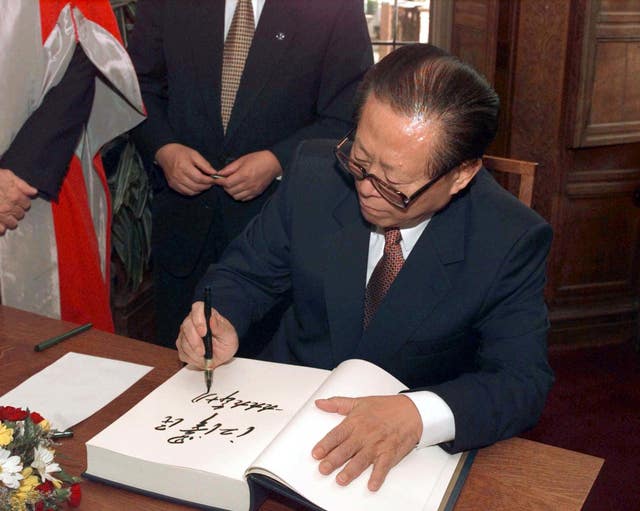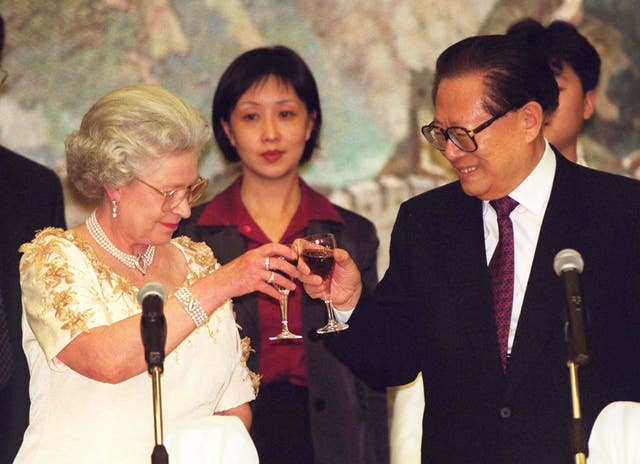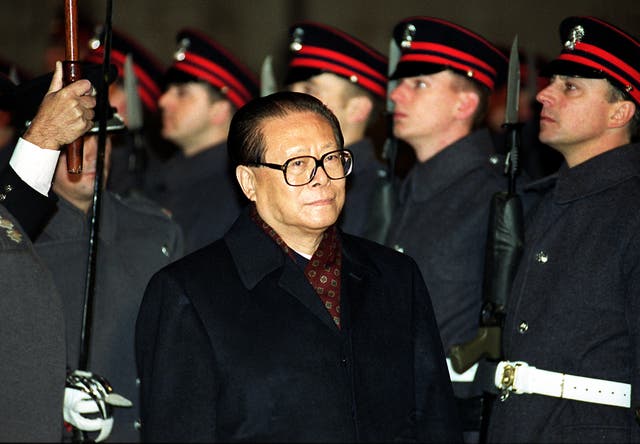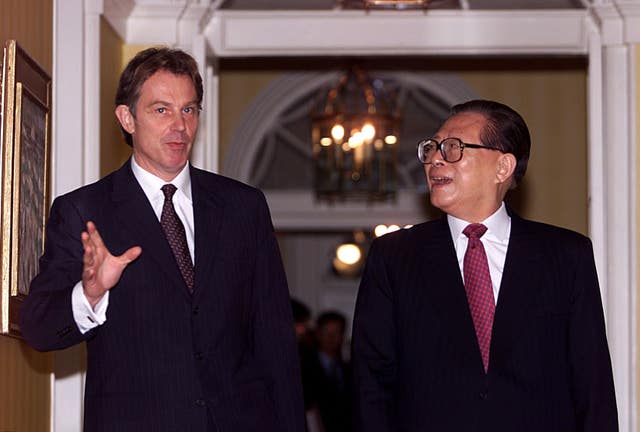Former Chinese president Jiang Zemin dies aged 96
He led the Communist Party after the brutal 1989 Tiananmen Square crackdown.

Former Chinese president Jiang Zemin has died aged 96, state TV reported.
Mr Jiang led his country out of isolation after the crushing of pro-democracy protests in Tiananmen Square in 1989 and supported economic reforms that led to a decade of explosive growth.
A surprise choice to lead a divided Communist Party after the 1989 Tiananmen crackdown, Mr Jiang saw China through history-making changes including a revival of market-oriented reforms, the return of Hong Kong from British rule in 1997 and Beijing’s entry into the World Trade Organisation (WTO) in 2001.
Even as China opened to the outside, Mr Jiang’s government stamped out dissent at home.
Mr Jiang gave up his last official title in 2004 but remained a force behind the scenes in the wrangling that led to the rise of current President Xi Jinping, who took power in 2012.
Mr Xi has stuck to Mr Jiang’s mix of economic liberalisation and strict political controls.
Initially seen as a transitional leader, Mr Jiang was drafted on the verge of retirement with a mandate from then-paramount leader Deng Xiaoping to pull together the party and nation.
But he proved transformative. In 13 years as Communist Party general secretary, the top position in China, he guided China’s rise to global economic power by welcoming capitalists into the Communist Party and pulling in foreign investment after China joined the WTO.

A former soap factory manager, Mr Jiang capped his career with the communist era’s first orderly succession, handing over his post as party leader in 2002 to Hu Jintao, who assumed the presidency the following year.
Mr Jiang tried to hold onto influence by staying on as chairman of the Central Military Commission, which controls the party’s military wing, the 2.3 million-member People’s Liberation Army. He gave up that post in 2004 following complaints he might divide the government.

He was said to be frustrated that Mr Deng had picked Mr Hu as the next leader, blocking Mr Jiang from installing his own successor. But Mr Jiang was considered successful in elevating allies to the party’s seven-member Standing Committee, China’s inner circle of power, when Mr Xi became leader in 2012.
Mr Jiang was an ebullient figure who played the piano and enjoyed singing, in contrast to his more reserved successors, Mr Hu and Mr Xi.
He spoke enthusiastic if halting English and would recite the Gettysburg Address for foreign visitors. On a visit to Britain, he tried to coax the Queen into singing karaoke.
Mr Jiang had faded from public sight and last appeared publicly alongside current and former leaders atop Beijing’s Tiananmen gate at a 2019 military parade celebrating the party’s 70th anniversary in power. He was absent from a major party congress last month where former leaders are given seats in recognition of their service.
He was preparing to retire when Mr Deng picked him in 1989 to replace party General Secretary Zhao Ziyang, who was purged due to his sympathy for the Tiananmen protesters and held under house arrest until his death in 2005.
A tough political fighter, Mr Jiang defied predictions that his stint as leader would be short. He consolidated power by promoting members of his “Shanghai faction” and giving the military double-digit annual percentage increases in spending.

After 12 years of negotiations, China joined the WTO in 2001, cementing its position as a magnet for foreign investment.
Despite a genial public image, Mr Jiang dealt severely with challenges to ruling party power.
His highest-profile target was Falun Gong, a meditation group founded in the early 1990s.
Chinese leaders were concerned by the group’s ability to attract tens of thousands of followers, including military officers.

“Stability above all else,” Mr Jiang ordered, in a phrase his successors have used to justify intensive social controls.
It fell to Mr Jiang, standing beside the then-prince of Wales, to preside over the return of Hong Kong from Britain on July 1 1997, symbolising the end of 150 years of European colonialism. The nearby Portuguese territory of Macao was returned to China in 1999.
Despite promising autonomy for Hong Kong, Mr Jiang turned to coercion with Taiwan, the self-ruled island Beijing says is part of its territory.

At the same time, trade between the mainland and Taiwan grew to billions of dollars per year.
China’s economic boom split its society into winners and losers, as waves of rural residents migrated to factory jobs in cities, and the economy grew sevenfold with urban incomes rising by nearly as much.
But these times also heralded unrest, with once-rare protests increasing as millions of people lost state jobs and farmers complained about rising fees and taxes. Divorce rates climbed, and corruption flourished.
Mr Jiang is survived by his two sons and his wife, Wang Yeping, who worked in government bureaucracies in charge of state industries.





